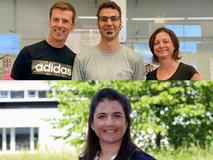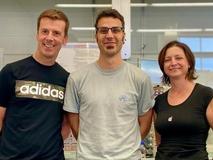CHF 40,000 for integral service for enzyme immobilization technologies and for small molecules drugs to detoxify toxic metals
29.08.2022
inSEIT and metaLead win Venture Kick's second stage of entrepreneurial and financial support. Their projects offer services focused on the screening, application, and scaling up of enzyme immobilization; and develop short peptides that tightly bind and detoxify toxic metals.
 inSEIT and metaLead teams
|
 inSEIT: from left to right, COO Gordon Honeyman, CEO and CSO David Roura Padrosa, President Advisory Board Francesca Paradisi
|
 metaLead: Michal Shoshan
|
inSEIT: integral Service for Enzyme Immobilization Technologies
The need to move towards greener manufacturing is imperious these days. In this sense, enzymes have emerged as an incredible alternative to traditional synthetic methods. Nonetheless, enzymes on their own suffer from poor reusability and stability in industrial setups. Therefore, enzyme immobilization has proven to be an enabling tool to bring enzymes to their next level in industrial production. Nonetheless, the need for expertise in the field and the current trial-and-error approach, make it risky and costly for non-experts. This hampers the broad application of enzyme immobilization.
inSEIT's founder Dr. David Roura Padrosa, COO Dr. Gordon Honeyman, and Key Advisor Prof. Francesca Paradisi from the University of Bern will offer services focused on the screening, application, and scaling up of enzyme immobilization to ensure the practical implementation in industrial setups. They have two main products: Immoscreen and CapiPy 2.0 The first one is a screening platform of immobilized enzymes, produced in-house, to be sold to companies and academic groups. Immoscreen will enhance reproducibility, and reduce the time and cost involved in the selection of immobilized enzymes. CapiPy 2.0 is a bioinformatics suite, licensed, and will provide a set of tools to enhance the predictability of enzyme immobilization.
The Venture Kick funds will enable them to develop the products and create a network that will ensure that inSEIT will launch with a solid base to compete in the Swiss market and the global market. inseit.ch
metaLead: short peptides to detoxify toxic metals
Lead (Pb) poisoning directly kills about 1 million people globally every year. Furthermore, 16% of children in the USA and every third child globally are poisoned by Pb, having elevated blood lead levels that are defined as dangerous. Pb is thus the most toxic metal to humans. Two drugs are used in the clinic, yet they suffer from low efficacy and high toxicity. Hence better medications that can safely treat children and adults are highly advantageous.
Michal Shoshan is currently a group leader at the Department of Chemistry of the University of Zurich. She holds a Ph.D. in Chemistry from the Hebrew University of Jerusalem and a post-doc from ETH Zurich. Her group developed short peptides that tightly bind and detoxify toxic metals. Their lead candidate was tested on mice and found to be significantly more potent than the two standards of care to treat Pb poisoning, and it also showed marginal toxicity. metaLead filed two patent applications, and they intend to test additional compounds in mice and conduct thorough preclinical studies. The product is a drug that replaces the current non-effective drugs against metal poisoning. Since their compound is safer and more potent, people who are currently not allowed to be treated, mainly children, pregnant women, and with relatively low metal levels, will receive their medication.
They plan to use the Venture Kick funds to further conduct efficacy studies of additional two candidates in mice and thoroughly examine their safety in vitro.
The need to move towards greener manufacturing is imperious these days. In this sense, enzymes have emerged as an incredible alternative to traditional synthetic methods. Nonetheless, enzymes on their own suffer from poor reusability and stability in industrial setups. Therefore, enzyme immobilization has proven to be an enabling tool to bring enzymes to their next level in industrial production. Nonetheless, the need for expertise in the field and the current trial-and-error approach, make it risky and costly for non-experts. This hampers the broad application of enzyme immobilization.
inSEIT's founder Dr. David Roura Padrosa, COO Dr. Gordon Honeyman, and Key Advisor Prof. Francesca Paradisi from the University of Bern will offer services focused on the screening, application, and scaling up of enzyme immobilization to ensure the practical implementation in industrial setups. They have two main products: Immoscreen and CapiPy 2.0 The first one is a screening platform of immobilized enzymes, produced in-house, to be sold to companies and academic groups. Immoscreen will enhance reproducibility, and reduce the time and cost involved in the selection of immobilized enzymes. CapiPy 2.0 is a bioinformatics suite, licensed, and will provide a set of tools to enhance the predictability of enzyme immobilization.
The Venture Kick funds will enable them to develop the products and create a network that will ensure that inSEIT will launch with a solid base to compete in the Swiss market and the global market. inseit.ch
metaLead: short peptides to detoxify toxic metals
Lead (Pb) poisoning directly kills about 1 million people globally every year. Furthermore, 16% of children in the USA and every third child globally are poisoned by Pb, having elevated blood lead levels that are defined as dangerous. Pb is thus the most toxic metal to humans. Two drugs are used in the clinic, yet they suffer from low efficacy and high toxicity. Hence better medications that can safely treat children and adults are highly advantageous.
Michal Shoshan is currently a group leader at the Department of Chemistry of the University of Zurich. She holds a Ph.D. in Chemistry from the Hebrew University of Jerusalem and a post-doc from ETH Zurich. Her group developed short peptides that tightly bind and detoxify toxic metals. Their lead candidate was tested on mice and found to be significantly more potent than the two standards of care to treat Pb poisoning, and it also showed marginal toxicity. metaLead filed two patent applications, and they intend to test additional compounds in mice and conduct thorough preclinical studies. The product is a drug that replaces the current non-effective drugs against metal poisoning. Since their compound is safer and more potent, people who are currently not allowed to be treated, mainly children, pregnant women, and with relatively low metal levels, will receive their medication.
They plan to use the Venture Kick funds to further conduct efficacy studies of additional two candidates in mice and thoroughly examine their safety in vitro.


